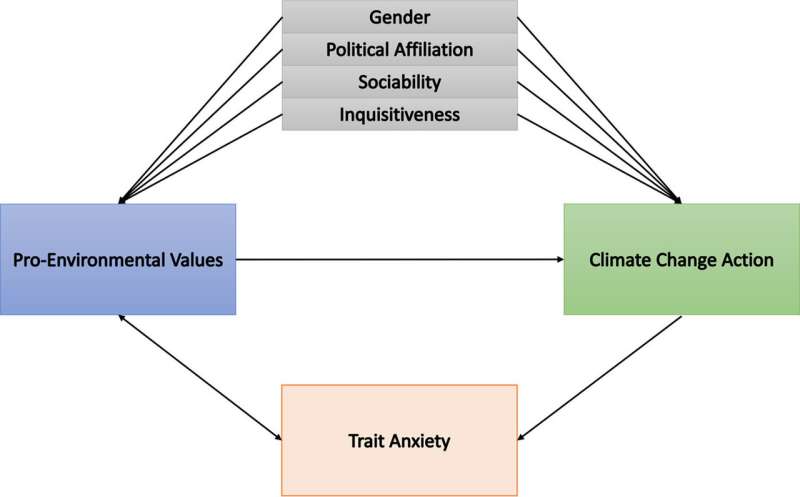This article has been reviewed according to Science X's editorial process and policies. Editors have highlighted the following attributes while ensuring the content's credibility:
fact-checked
peer-reviewed publication
trusted source
proofread
Anxious people more likely to act to mitigate climate change, expert says

The angst of naturally anxious people may actually help the planet, says a Brock University expert in biology and psychology.
"If you have high environmental values and high trait anxiety, you're much more likely than others to engage in actions that mitigate climate change," says Professor of Biological Sciences and Psychology Gary Pickering.
Pickering's lab examines the relationships between environmental values, climate action and personality with the goal of understanding what motivates, and prevents, individuals from doing what they can to address the climate change crisis.
His past research includes lifestyle changes youth are willing, and unwilling, to make and the role confidence plays in youth taking action.
In his latest research, published in Personality and Individual Differences, Pickering and post-doctoral fellow Gillian Dale used a Brock-created tool called the HEXACO Personality Inventory to tease out factors that would make it more likely for people to recycle, reuse, take public transport and eat less red meat, among other lifestyle changes.
The HEXACO scale includes six major personality traits: honesty-humility; emotionality; extraversion; agreeableness; consciousness; and openness to experience. Within these groupings are sub-categories of traits.
In their April 2023 study, "Trait anxiety predicts pro-environmental values and climate change action," Pickering and Dale surveyed 336 Canadian participants through an online questionnaire that gathered their demographic information and assessed their personality according to the HEXACO scale. The survey also asked participants about their environmental values and whether they had changed their actions due to climate change considerations.
About 81% of participants said climate change considerations motivated them to change their behaviors, with 37% identifying climate change as being a "major factor."
The researchers found that trait anxiety was the strongest predictor of both pro-environmental values and climate change action.
"For individuals with high environmental values, a moderate degree of anxiety can motivate them to change their behaviors around climate action, but there is a sweet spot; too much anxiety may paralyze people into inaction," says Pickering.
Pickering makes a distinction between "trait" and "situational" anxiety saying that, while everyone experiences anxiety under certain conditions, some people are "hardwired" from birth with the tendency to be anxious.
The study identifies personality traits most likely to result in high environmental values: anxiety, greed avoidance, sentimentality, diligence, perfectionism, prudence, aesthetic appreciation and unconventionality.
Regarding climate change actions, people most likely to exhibit environmentally friendly behaviors are those who scored higher for anxiety, greed avoidance, sentimentality, aesthetic appreciation, unconventionality, inquisitiveness, social boldness and sociability.
When the researchers examined participants' demographics, they found women and those with a liberal political affiliation were more likely to have high environmental values and take climate change actions than their male and conservative counterparts.
More information: Gary J. Pickering et al, Trait anxiety predicts pro-environmental values and climate change action, Personality and Individual Differences (2023). DOI: 10.1016/j.paid.2023.112101
Journal information: Personality and Individual Differences
Provided by Brock University





















